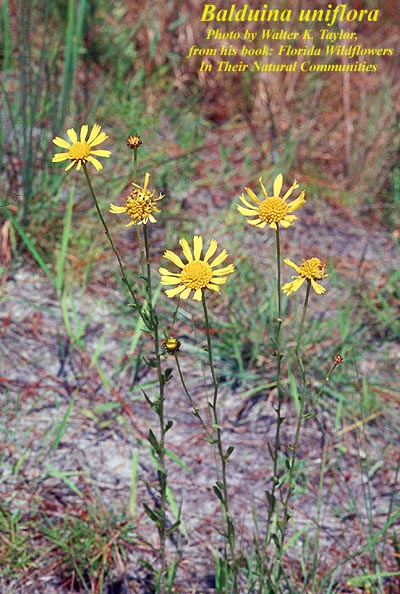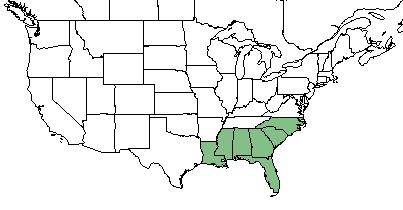Difference between revisions of "Balduina uniflora"
(→Taxonomic Notes) |
(→Ecology) |
||
| Line 34: | Line 34: | ||
===Phenology=== <!--Timing off flowering, fruiting, seed dispersal, and environmental triggers. Cite PanFlora website if appropriate: http://www.gilnelson.com/PanFlora/ --> | ===Phenology=== <!--Timing off flowering, fruiting, seed dispersal, and environmental triggers. Cite PanFlora website if appropriate: http://www.gilnelson.com/PanFlora/ --> | ||
In the southeastern and mid-Atlantic United States, flowering occurs from late July through September.<ref name="Weakley 2015"/> Another, study reports flowering starting in June.<ref name="Parker & Jones 1975"/> | In the southeastern and mid-Atlantic United States, flowering occurs from late July through September.<ref name="Weakley 2015"/> Another, study reports flowering starting in June.<ref name="Parker & Jones 1975"/> | ||
| − | + | ||
| + | ===Seed dispersal=== | ||
| + | This species is thought to be dispersed by wind. <ref> Kirkman, L. Katherine. Unpublished database of seed dispersal mode of plants found in Coastal Plain longleaf pine-grasslands of the Jones Ecological Research Center, Georgia.</ref> | ||
<!--===Seed bank and germination===--> | <!--===Seed bank and germination===--> | ||
Revision as of 18:53, 28 August 2018
| Balduina uniflora | |
|---|---|

| |
| Photo by Altas of Florida Plants Database | |
| Scientific classification | |
| Kingdom: | Plantae |
| Division: | Magnoliophyta - Flowering plants |
| Class: | Magnoliopsida - Dicots |
| Order: | Asterales |
| Family: | Asteraceae |
| Genus: | Balduina |
| Species: | B. uniflora |
| Binomial name | |
| Balduina uniflora Nutt. | |

| |
| Natural range of Balduina uniflora from USDA NRCS Plants Database. | |
Common Names: savanna honeycomb-head; yellow Balduina;[1] oneflower honeycombhead[2]
Contents
Taxonomic Notes
Synonym: Endorima uniflora (Nuttall) Rafinesque [1]
Description
Balduina uniflora is a dioecious perennial that grows as a forb/herb.[2] Its roots are fleshy[3] and have a mean depth of 15.75 cm and porosity of 0.0%.[4] It reproduces vegetatively from root stocks and can reach heights of 0.7-1.0 m. Inflorescence contain 1-3 heads, each with ray flowers 8-22, 5.5-8.2 mm long and 1-2 mm wide. Flowers are yellow.[3]
Distribution
It is found from eastern Louisiana, eastward throughout the panhandle of Florida and southeastern Georgia, and northward to southeastern North Carolina.[2]
Ecology
Habitat
This species is found in wet pine savannas, pine flatwoods,[1] and the margins of pitcher-plant bogs.[3]
Phenology
In the southeastern and mid-Atlantic United States, flowering occurs from late July through September.[1] Another, study reports flowering starting in June.[3]
Seed dispersal
This species is thought to be dispersed by wind. [5]
Fire ecology
In Mississippi pine barrens, flowering increased significantly from one year after a burn into the second year following a burn.[6]
Pollination
It attracts bumblebees and butterflies which pollinates it.[7] Pollen grains are 40-45 µm in diameter.[3]
Conservation and Management
Cultivation and restoration
Photo Gallery
References and notes
- ↑ 1.0 1.1 1.2 1.3 Weakley AS (2015) Flora of the Southern and Mid-Atlantic States. Chapel Hill, NC: University of North Carolina Herbarium.
- ↑ 2.0 2.1 2.2 USDA NRCS (2016) The PLANTS Database (http://plants.usda.gov, 26 January 2018). National Plant Data Team, Greensboro, NC 27401-4901 USA.
- ↑ 3.0 3.1 3.2 3.3 3.4 Parker ES, Jones SB (1975) A systematic study of the genus Balduina (Compositae, Heliantheae). Brittonia 27(4):355-361.
- ↑ Brewer JS, Baker DJ, Nero AS, Patterson AL, Robers RS, Turner LM (2011) Carnivoory in plants as a beneficial trait in wetlands. Aquatic Botany 94:62-70.
- ↑ Kirkman, L. Katherine. Unpublished database of seed dispersal mode of plants found in Coastal Plain longleaf pine-grasslands of the Jones Ecological Research Center, Georgia.
- ↑ Hinman SE, Brewer JS (2007) Responses of two frequently-burned wet pine savannas to an extended period without fire. Journal of the Torrey Botanical Society 134(4):512-526.
- ↑ Pitts-Singer TL, Hanula JL, Walker JL (2002) Insect pollinators of three rare plants in a Florida longleaf pine forest. Florida Entomologist 85(2):308-316.